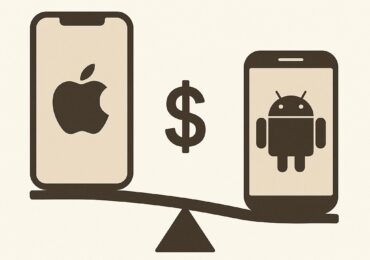
The dominance of smartphones in everyday life is undeniable. Whether you checked your phone minutes ago or are reading this article on one right now, mobile applications have become an indispensable part of our routines. For businesses, this means an ever-growing market to tap into. The mobile app industry is forecasted to soar to $366.34 billion by 2027, driven by advancements in geolocation, artificial intelligence, and augmented reality.
For entrepreneurs and developers looking to capitalize on this surge, the biggest question remains: which mobile platform offers better profitability—iOS or Android? Both ecosystems have distinct advantages, and the choice can significantly impact revenue generation. Let’s explore the critical factors to consider when selecting between the two.
Market share, user demographics, and monetization
Globally, Android holds the lion’s share of the mobile OS market, with approximately 73%, while iOS accounts for around 21%. However, this broad statistic does not tell the full story. iOS dominates in North America, Australia, and parts of Western Europe, where users typically have higher purchasing power. Meanwhile, Android thrives in regions like Asia, Africa, and South America, where affordability drives adoption.
Monetization strategies also differ. Historically, iOS users have been more willing to pay for apps, contributing to higher average revenue per user (ARPU). The App Store generates almost twice the revenue of the Google Play Store, making iOS a lucrative choice for developers relying on paid apps or in-app purchases. However, Android’s vast user base allows for substantial earnings through ad-based monetization, making it an excellent choice for freemium models.
Development costs, customization, and time to market
The cost and complexity of development vary between the two platforms. Apple’s ecosystem is more standardized, with fewer device variations, making development smoother. In contrast, Android operates across thousands of device models, necessitating extensive testing for compatibility. This increases development time and cost but offers greater flexibility in customization.
For businesses seeking rapid deployment, iOS often has an edge due to its streamlined approval process and uniformity. Google Play’s review period can extend up to a week, whereas Apple’s App Store usually approves apps within 24–48 hours. This difference becomes particularly crucial when rolling out updates or bug fixes.
Security and user retention
Security is a significant consideration. Apple’s closed ecosystem and stringent app review process provide robust protection against malware and data breaches. Android’s open-source nature, while fostering innovation, makes it more vulnerable to security risks. Businesses handling sensitive user data might prefer iOS for its enhanced security framework.
When it comes to user retention, iOS leads with a higher lifetime value (LTV) per user. Studies indicate that iOS users spend more on subscriptions, in-app purchases, and premium services compared to Android users. This makes mobile app development services for iOS particularly appealing for businesses focused on long-term profitability.
The verdict: which platform to choose?
Ultimately, the choice between iOS and Android depends on the business model. If targeting a high-spending audience with paid apps or subscriptions, iOS is the preferable choice. For broad reach and ad-driven revenue, Android offers unmatched potential. In many cases, launching on both platforms maximizes profitability. Regardless of the platform, investing in expert mobile app development services ensures a competitive edge in this thriving market.
If you’re looking to turn your app idea into a revenue-generating product, partnering with a professional team specializing in mobile app development services can make all the difference. With the right approach, your app could be the next big success in the mobile industry.